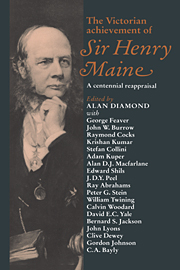Book contents
- Frontmatter
- Contents
- Notes on contributors
- Foreword by Sir John Lyons
- Introduction
- 1 The Victorian values of Sir Henry Maine
- PART 1 MAINE AND THE IDEA OF PROGRESS
- 2 Henry Maine and mid-Victorian ideas of progress
- 3 Maine, progress and theory
- 4 Maine and the theory of progress
- 5 Democracy and excitement: Maine's political pessimism
- PART 2 MAINE AND THE SOCIAL SCIENCES
- PART 3 MAINE ON LAW, LEGAL CHANGE AND LEGAL EDUCATION
- PART 4 MAINE AND INDIA
- Appendix: the conference programme
- Bibliography
- Index
3 - Maine, progress and theory
Published online by Cambridge University Press: 04 September 2009
- Frontmatter
- Contents
- Notes on contributors
- Foreword by Sir John Lyons
- Introduction
- 1 The Victorian values of Sir Henry Maine
- PART 1 MAINE AND THE IDEA OF PROGRESS
- 2 Henry Maine and mid-Victorian ideas of progress
- 3 Maine, progress and theory
- 4 Maine and the theory of progress
- 5 Democracy and excitement: Maine's political pessimism
- PART 2 MAINE AND THE SOCIAL SCIENCES
- PART 3 MAINE ON LAW, LEGAL CHANGE AND LEGAL EDUCATION
- PART 4 MAINE AND INDIA
- Appendix: the conference programme
- Bibliography
- Index
Summary
Maine is remembered as a man with firm opinions. He certainly knew his mind in respect of the patterns of legal history. As is well known, in considering the instruments used to bring law into harmony with society he identified legal fictions, equity and legislation and immediately proceeded to the remarkable claim that ‘Their historical order is that in which I have placed them’ (AL: 25). This tone of dismissive confidence is typical of his works. For example, at almost the same time the reader is informed that ‘it is indisputable that much the greatest part of mankind has never shown a particle of desire that its civil institutions should be improved’ (AL: 22); and in considering the entirety of modern Chinese society he insisted that progress had apparently been arrested ‘because the civil laws are coextensive with all the ideas of which the race is capable’ (AL: 23). The same approach may be found in his later works, where he often made observations such as that ‘nothing is more certain than that the mental picture which enchains the enthusiast for benevolent democratic government is altogether false’ (PG: 45).
Since Maine's death most critics had concentrated upon lively generalizations such as these. In particular there have been sustained and hostile debates about his statements concerning patriarchal society and primitive law. There have also, of course, been arguments about his claim that the movement of progressive societies had been ‘a movement from Status to Contract’ (AL: 170).
- Type
- Chapter
- Information
- The Victorian Achievement of Sir Henry MaineA Centennial Reappraisal, pp. 70 - 75Publisher: Cambridge University PressPrint publication year: 1991
- 1
- Cited by



